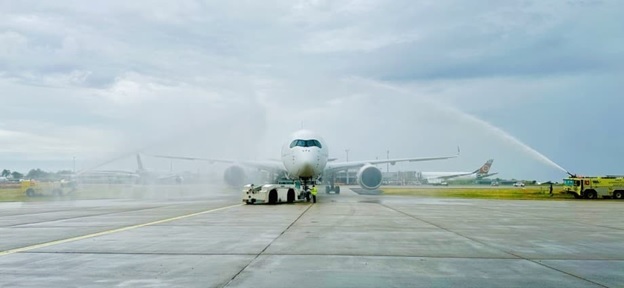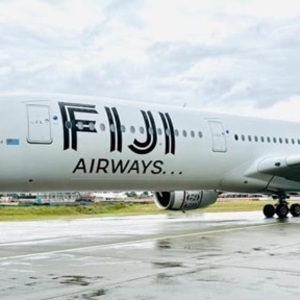Fiji Airways fuels flight with SAF blend



November 22, 2023
BY Fiji Airways
Fiji Airways, Fiji’s National Airline, is proud to announce a significant milestone on our journey towards a more sustainable future for aviation.
Today, Fiji Airways’ newest Airbus A350-900 XWB aircraft, named the Island of Vatulele, arrived into Nadi, Fiji from Singapore, having flown the entire 8,520 kilometer (km) journey powered by a sustainable aviation fuel (SAF) blend.
This is the first time ever that Fiji Airways has operated a flight using a SAF blend.
Andre Viljoen, Fiji Airways managing director and CEO, said that this inaugural SAF blend - powered flight demonstrates Fiji Airways’ commitment to reducing its carbon footprint and ensuring a sustainable future for aviation.
Advertisement
"As the national carrier of a small island developing state, we are acutely aware of the need for urgent action to combat climate change,” he said. “As an airline, most of our carbon emissions are generated by using jet fuel, so to meaningfully reduce our carbon footprint, we must embrace using a blend of sustainable fuels.
“Sustainable aviation fuels are produced from sustainable materials, and produce up to 80 percent less carbon emissions than conventional jet fuel. By using sustainable fuels, Fiji Airways and all airlines can make a significant contribution to the fight against climate change.
“Whilst we may be a small airline, we have a bold sustainability vision. We firmly believe that every airline, regardless of size, can and must contribute to the preservation of our planet.”
Fiji Airways is about to launch a global fuel supply tender in order to secure future supply of SAF to meet its sustainability objectives of using a SAF blend.
“SAF comes with its own set of challenges because the production processes are complex, and there are only a small number of producers,” Viljoen said. “Consequently, sustainable fuels are significantly (between 4 to 8 times) more expensive than conventional jet fuel, and are in short supply.
Advertisement
“Many larger airlines with more resources have already bought up significant quantities of future SAF capacity, making it somewhat challenging to secure future supply,” he added. “As demand for sustainable fuels increases, we will see investment and production ramp up, and it will become much easier and more affordable for airlines to acquire SAF. We are exploring all options, including the potential for SAF production in Fiji.”
The Island of Vatulele will be the fourth next-generation Airbus A350 aircraft to enter the Fiji Airways fleet. Fiji Airways now has one of the youngest, most modern, and most fuel-efficient fleets of aircraft in the world.
Related Stories
Keolis Commuter Services, the Massachusetts Bay Transportation Authority’s operations and maintenance partner for the Commuter Rail, has launched an alternative fuel pilot utilizing renewable diesel for some locomotives.
Virgin Australia and Boeing on May 22 released a report by Pollination on the challenges and opportunities of an International Book and Claim system for sustainable aviation fuel (SAF) accounting.
Chevron U.S.A. Inc. on May 15 filed a notice with the Iowa Workforce Development announcing plans to layoff 70 employees at its Ames, Iowa, location by June 18. The company’s Chevron REG subsidiary is headquartered in Ames.
Luxury North Dakota FBO, Overland Aviation—together with leading independent fuel supplier, Avfuel Corp.— on May 19 announced it accepted a 8,000-gallon delivery of sustainable aviation fuel (SAF) on May 12.
May 21 marks the official launch of the American Alliance for Biomanufacturing (AAB), a new coalition of industry leaders committed to advancing U.S. leadership in biomanufacturing innovation, competitiveness, and resilience.
Upcoming Events










